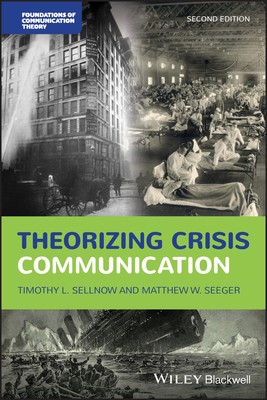
- We will send in 10–14 business days.
- Author: Timothy L Sellnow
- Publisher: Wiley-Blackwell
- ISBN-10: 1119615917
- ISBN-13: 9781119615910
- Format: 15.2 x 22.6 x 1.8 cm, softcover
- Language: English
- SAVE -10% with code: EXTRA
Reviews
Description
Explore the major theories within crisis communication, fully revised and updated
Theorizing Crisis Communication provides a comprehensive and state-of-the-art review of both current and emerging theoretical frameworks designed to explain the development, management, and consequences of natural and human-caused crises. A critique of the many theoretical approaches of crisis communication, this volume provides readers with an in-depth understanding of the management, response, resolution, and significance of failures in corporate responsibility, as well as destructive global events such as pandemics, earthquakes, hurricanes, tsunamis, chemical spills, and terrorist attacks.
This second edition contains new theories from related subfields and updated examples, references, and case examples. New chapters discuss metatheoretical considerations and theoretical advancements in the study of social media. Throughout the text, the authors highlight similarities, patterns, and relationships across different crisis types and offer insight into the application of theory in the real world. Integrating work from organizational studies, social sciences, public relations, and public health, this book:
- Covers a broad range of crisis communication theories, including those relevant to emergency response, risk management, ethics, resilience and crisis warning, development, and outcomes Presents theoretical frameworks based on research disciplines including sociology, psychology, applied anthropology, and criminal justice Provides clear and compelling examples of application of theory in contexts such as rhetoric, mass communication, social media, and warning systems Offers a systematic and accessible presentation of topics by explaining each theory, describing its applications, and discussing its advantages and drawbacks
Theorizing Crisis Communication, Second Edition, is the perfect textbook for advanced undergraduate and graduate students of crisis and risk communication, and an importance reference for scholars, researchers, and practitioners in fields including crisis communication, emergency management, disaster studies, sociology, psychology, and anthropology.
EXTRA 10 % discount with code: EXTRA
The promotion ends in 16d.21:00:41
The discount code is valid when purchasing from 10 €. Discounts do not stack.
- Author: Timothy L Sellnow
- Publisher: Wiley-Blackwell
- ISBN-10: 1119615917
- ISBN-13: 9781119615910
- Format: 15.2 x 22.6 x 1.8 cm, softcover
- Language: English English
Explore the major theories within crisis communication, fully revised and updated
Theorizing Crisis Communication provides a comprehensive and state-of-the-art review of both current and emerging theoretical frameworks designed to explain the development, management, and consequences of natural and human-caused crises. A critique of the many theoretical approaches of crisis communication, this volume provides readers with an in-depth understanding of the management, response, resolution, and significance of failures in corporate responsibility, as well as destructive global events such as pandemics, earthquakes, hurricanes, tsunamis, chemical spills, and terrorist attacks.
This second edition contains new theories from related subfields and updated examples, references, and case examples. New chapters discuss metatheoretical considerations and theoretical advancements in the study of social media. Throughout the text, the authors highlight similarities, patterns, and relationships across different crisis types and offer insight into the application of theory in the real world. Integrating work from organizational studies, social sciences, public relations, and public health, this book:
- Covers a broad range of crisis communication theories, including those relevant to emergency response, risk management, ethics, resilience and crisis warning, development, and outcomes Presents theoretical frameworks based on research disciplines including sociology, psychology, applied anthropology, and criminal justice Provides clear and compelling examples of application of theory in contexts such as rhetoric, mass communication, social media, and warning systems Offers a systematic and accessible presentation of topics by explaining each theory, describing its applications, and discussing its advantages and drawbacks
Theorizing Crisis Communication, Second Edition, is the perfect textbook for advanced undergraduate and graduate students of crisis and risk communication, and an importance reference for scholars, researchers, and practitioners in fields including crisis communication, emergency management, disaster studies, sociology, psychology, and anthropology.


Reviews